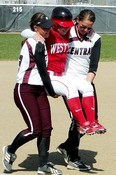
Every sport uses player and team statistics and standings that reflect win-loss percentages to determine the quality of their performance. Schools use student test scores and walk through data to determine the use and impact of instructional practices. We really have a lot of ways to give us information about how we're doing. Data matters, but does it give us the whole picture? Does it measure the value? Does it recognize the intangibles? I measured each thing correctly on my cookies, so the data says they should be great... but it's not until we taste them that we really find out just how good they are.
How do all those things we typically measure really matter? We can count and measure as we attempt to quantify a lot of "things," but is it really the "things" that make a difference in our lives, or is it those moments, experiences, and feelings that we can't touch that leave the biggest footprints? How do we measure those? How do we measure quality or impact in the real sense?
On paper that sport team may look great, but what if they don't win? Or more importantly, what about the team that doesn't look so good on paper but still finds ways to win? How do you measure what you can't see - those qualities that really do make a difference?
How do you pinpoint what character or sportsmanship looks like in action or the effect that it has? We identify specific traits, but until you see it happen, it's not the same. If you haven't seen the video of the college softball players carrying their 5'2" opponent around the bases so she could complete her one and only (and final) home run of her career, then click here for that experience. How do you truly measure the impact on the lives that those girls touched with their selfless act? You only have to see the emotional responses of the player and the respective coaches to see what I mean, not to mention all those who witnessed it.
I read an article this week by Grant Wiggins that really spoke to what matters in education, but also really extends to life outside of school too. The article entitled "Two Student Beliefs That Can Change Everything," brought to the forefront the importance of relationships in schools. We are at a crossroads in Kansas where the Department of Education is asking schools to stress the importance of relationships as part of their accreditation process, and yet the political sentiment seems to be unraveling relationships with educators, giving them little hope for a bright future. There is much research out there that supports the idea that relationships matter. What does it look like when actions establish relationships that make a difference?
The first belief Wiggins discussed was "my school is committed to building the strengths of each student." What if we all did that....in our homes, in our businesses, in our churches, in our communities? What if we made it a priority to build on the strengths of all people? What would that look like? What would be the result?
Don't you enjoy life more when you do the things you love doing? You enjoy them because you are good at them - that is playing to your strengths. Which subjects did you like best in school? The ones that were hard and made you feel stupid? Of course not...it was the ones where you "got it" and you found success. I'm not talking about avoiding challenges, but making those challenges attainable by playing to our strengths. What if we identified, encouraged and promoted the development of our own strengths and the strengths of others? When we recognize the interests and abilities of others and facilitate their use, we achieve greater buy-in and greater success. We can win even if we don't look good on paper.
The second belief was equally compelling: "I have at least one teacher that makes me excited about the future." Everyone needs to feel like there is something to look forward to and that someone believes in them. Let's not just leave that to the teachers. Families can do that for each other. Mentors can do that (formal or informal). Employers can do that for employees. What if each of us examined our own actions? Do we help people by giving them feedback, encouragement, or the tools to make them more successful? Are we building up or tearing down? Helping others is a win-win situation for both the doer and the receiver.
Everyday one can read posts on social media or watch news reports that reveal just how important relationships are to human existence. We celebrate when relationships bloom and mourn when they fade away. We "like" statuses that say what we feel, wish we could say, or what we hope to see in this world. We recognize heroes and soldiers, and share joyous events. We ask for prayer because we recognize the need for more than we can provide. Most recently, we have seen how communities and strangers banded together to help storm victims in the south. We have seen a hero die, using his last ounce of strength, to save another. I like how NBC News often closes their evening broadcast featuring people who make a difference. When we utilize all of our strengths we create a brighter future for not only ourselves, but for those around us. Instead of trying to measure that, maybe we should just try to measure up.
 RSS Feed
RSS Feed